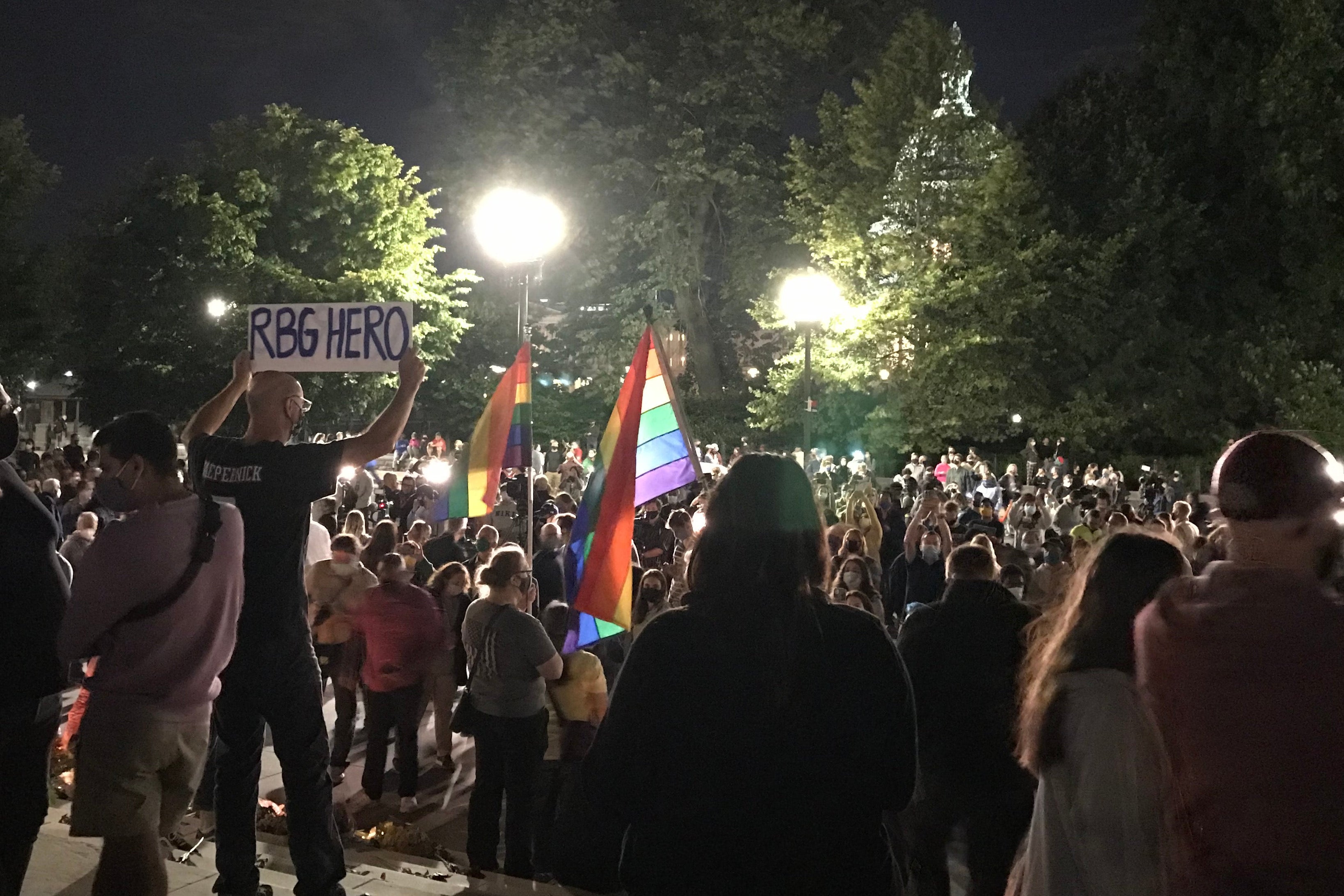“That’s how you judge a person: who comes out when you’re gone,” said Heather Woods, who had traveled from D.C.’s Navy Yard neighborhood to the steps of the Supreme Court late Friday night. “You see the people out here. You see every color, every race, every gender. This is reflective. She stood for America. She stood for our values.”
Shortly after the announcement of the death of Ruth Bader Ginsburg Friday, an impromptu vigil of hundreds of people gathered on the steps of the Supreme Court to pay tribute to the Supreme Court justice and feminist icon.
Mourners lit candles and laid flowers on the steps of the court, waved gay pride flags, and held signs reading “Notorious,” “Thank you, RBG,” and “Honor her wish,” referring to her admonishment, shortly before her death, that her replacement not be named until after the presidential election. Songs including “Lean on Me,” “Amazing Grace,” and “Let It Be” were sung by the mask-wearing crowd. In a nod to Ginsburg’s Jewish heritage, and the fact that it was the first night of Rosh Hashanah, a woman recited the mourner’s kaddish and at one point, a shofar was blown. The vigil was briefly interrupted by a right-wing demonstrator chanting “Roe v. Wade is dead!” into a megaphone until he was drowned out by chants of “R-B-G.”* But for the most part, it was a calm and, at times, even celebratory gathering.
Rikki Grosskopf, 25, said arriving at the event made her feel “weirdly a little bit happy. It’s good to know that people care. I hope that she knew how well loved she was.”
Heidi Parsont, who came into D.C. from Alexandria, Virginia, with her husband and teenage daughter, said, “RBG has done amazing things for women. It was really important to show [my daughter] that a lot of people see the same way, and that it’s an important part of our history. And hopefully her generation can take it and do more with it.”
Richard Cerros, 30, noted, “This is not organized, it’s not coordinated. It’s a testament to the work that she did.” He continued: “As a Hispanic, LGBTQIA person, this is something that goes down to our core. She really represented our folks and represented the spirit of public service.”
Grayson Alexander, a 34-year-old congressional intern, said, “I’m getting ready to leave D.C. in a week, and I can’t think of a place I’d rather be. We need a moment to mourn before we jump into whatever the next thing is. As much as you don’t want to bring up the big fight ahead, you can’t help but think of it.”
Most of those at the gathering expressed anxiety about the coming weeks, in which a bruising confirmation battle could unfold. Tori Collins, a neighbor of Woods who came with her from Navy Yard, said, “That’s her legacy: blazing a trail, speaking truth to power. We need to make sure that her seat is not disgraced.”
Maya Rodriguez, a 23-year-old who works for a political nonprofit, noted, “Brett Kavanaugh is in his 50s. We could be dealing with the repercussions of this for 30 or 40 years or so, and that’s really scary.”
Many of those in attendance noted that they had been at the 2016 Women’s March or the recent Black Lives Matter protests, and expressed general fears about the state of the country that went beyond just the next Supreme Court pick.
“Not only am I mourning the loss of a great feminist icon and a great Supreme Court justice, but the potential loss of my rights as a woman and a person of color,” said Shonali Bose, a 22-year-old who works for the Biden campaign.
“I’m a white, educated woman, and I’m terrified. I can’t imagine how people of color feel. This is wrong. It’s scary,” said Kelly Shand, who came with Woods and Collins.
“It just feels like we’re taking giant leaps backward as a country,” said Sara Sullivan, 74. “We’ve been at this a long time. I say, like lots of old ladies, ‘I thought we did this already.’ ”
The emotions at the event reflected not just Ginsburg’s long career, but her emergence in recent years as an icon for the American left and feminism.
“She’s been described as a warrior, and I think that’s absolutely what she was,” said Sullivan.
“She changed laws that were written by white, landowning men,” said Woods. “People whitewash the women’s movement, they demonize feminism. Some women don’t understand that they’d be washing somebody’s laundry if it wasn’t for people like Ruth Bader Ginsburg.”
Chad Caldwell, 28, put it more simply: “She’s notorious. What else can you say?”
Correction, Sept. 19, 2020: This post originally misspelled Roe.

